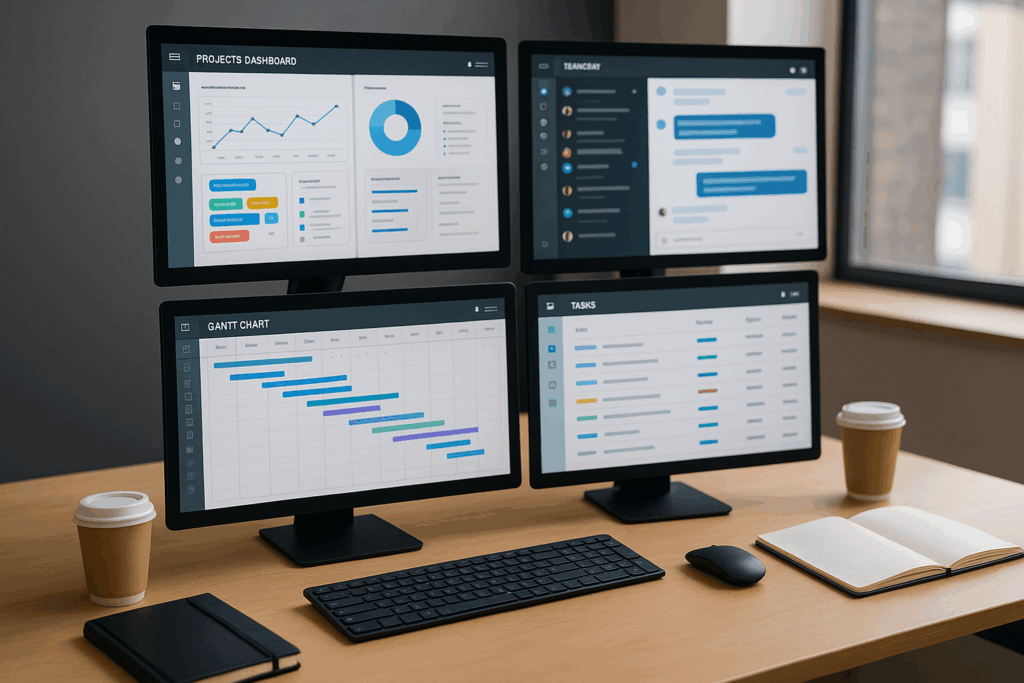In 2025, project management software has evolved into an indispensable asset for teams across industries, offering solutions that transcend basic task tracking to integrate advanced collaboration, resource optimization, and strategic planning. The landscape is rich with tools designed to cater to diverse needs-from agile development teams to creative agencies and enterprise-level project portfolios. Below, we explore the standout platforms reshaping how teams organize, execute, and deliver projects this year, emphasizing features, adaptability, and real-world applications.
Key Features Defining Modern Project Management Tools
The best project management software in 2025 prioritizes unified workflows, combining task management, resource allocation, and real-time communication into cohesive systems. Gantt charts remain critical for visualizing timelines and dependencies, while automated budget tracking ensures financial oversight without manual data entry. Tools like Scoro highlight the importance of streamlined project quotes, enabling teams to generate client proposals directly within the platform and convert approvals into actionable plans instantly.
Collaboration tools have also advanced, with embedded chat functions and file-sharing capabilities reducing reliance on external communication apps. Platforms like Wrike and monday.com offer customizable dashboards, allowing teams to tailor views to specific projects-whether through Kanban boards for agile workflows or calendar layouts for deadline-driven tasks. For distributed teams, offline access and multi-device synchronization are non-negotiable, ensuring seamless updates across mobile and desktop environments.
Top Paid Platforms for Enterprise and Scaling Teams
monday.com continues to dominate as an all-in-one solution, praised for its intuitive interface and adaptability. Its AI-powered insights suggest task prioritization and automate routine updates, while portfolio management features provide executives with high-level overviews of multiple projects. The platform’s CRM integration also makes it ideal for client-focused industries, bridging project execution and customer relationship management.
Wrike stands out for cross-functional collaboration, particularly in large organizations. Its granular customization allows teams to create bespoke workflows, from marketing campaigns to product launches. Advanced time-tracking and approval workflows ensure accountability, while risk prediction algorithms alert managers to potential bottlenecks before they escalate.
For software developers, Jira remains unmatched in agile project management. Its sprint planning tools, backlog grooming features, and integration with GitHub streamline the entire development lifecycle. Meanwhile, Smartsheet appeals to enterprises needing spreadsheet-like functionality with enhanced automation, ideal for financial planning and complex data tracking.
Free and Budget-Friendly Solutions for Startups and SMBs
Smaller teams and startups often prioritize cost-effectiveness without sacrificing functionality. ProProfs Project offers a robust free tier with Gantt charts, time tracking, and client invoicing, making it a favorite for freelancers and small agencies. Its simplicity in converting proposals into actionable plans reduces administrative overhead, while real-time updates keep stakeholders aligned.
Zoho Projects combines affordability with depth, particularly for businesses already using Zoho’s ecosystem. Features like task automation and issue tracking simplify workflow management, while its integrated chat and document storage centralize communication. The free version supports up to three users, with premium plans scaling affordably as teams grow.
ClickUp bridges the gap between simplicity and power, offering mind-mapping tools and custom reporting even in its free tier. Its modular design allows teams to enable features as needed, avoiding the bloat of overly complex systems.
Open-Source Alternatives for Data Sovereignty and Customization
Organizations prioritizing data control and customization increasingly turn to open-source solutions. OpenProject leads this space, offering self-hosted deployments and GDPR compliance. Its roadmap planning and bug tracking modules cater to software teams, while time and budget tracking suit traditional project management. Hosting options in the EU ensure compliance for global teams wary of data privacy risks.
Taiga and GitLab are favored by development teams for their DevOps integrations and scrum boards. Taiga’s minimalist interface reduces clutter, while GitLab’s CI/CD pipeline tools automate testing and deployment, embedding project management directly into the development process.
Industry-Specific Solutions and Emerging Trends
The rise of industry-specific templates allows teams to bypass generic setups. For example, Trello excels in creative workflows with its visual Kanban boards, while Adobe Workfront integrates seamlessly with Creative Cloud for marketing teams. Notion has carved a niche in document-driven projects, combining wikis, databases, and task lists for content-heavy workflows like publishing or product documentation.
A notable 2025 trend is the emphasis on sustainability metrics. Tools like TeamGantt now include carbon footprint tracking for project phases, aligning with corporate ESG goals. Similarly, resource management modules in platforms like Smartsheet optimize not just budgets but also energy consumption, particularly for manufacturing and construction sectors.
Choosing the Right Tool: A Strategic Approach
Selecting project management software in 2025 requires aligning tool capabilities with organizational maturity. Startups and remote teams might prioritize user-friendly interfaces and free tiers (e.g., ClickUp, Trello), while enterprises should focus on scalability and integration depth (e.g., Wrike, Jira). Open-source platforms like OpenProject appeal to regulated industries needing data sovereignty, whereas creative agencies may favor visually driven tools like monday.com or Asana.
Trials remain essential-most platforms offer 14–30-day free periods. During testing, evaluate how well the tool adapts to existing workflows, reduces manual input through automation, and provides actionable insights via analytics.
Conclusion: The Future Is Integrated and Adaptive
The project management tools of 2025 are no longer siloed applications but central hubs that connect strategy, execution, and analysis. As remote work and global collaborations persist, the demand for real-time, flexible, and secure platforms will only grow. Whether through open-source customization, AI-enhanced automation, or industry-specific adaptations, the right software transforms project chaos into structured success, ensuring teams not only meet deadlines but innovate with confidence.



Merely wanna input that you have a very nice website , I love the design and style it actually stands out.